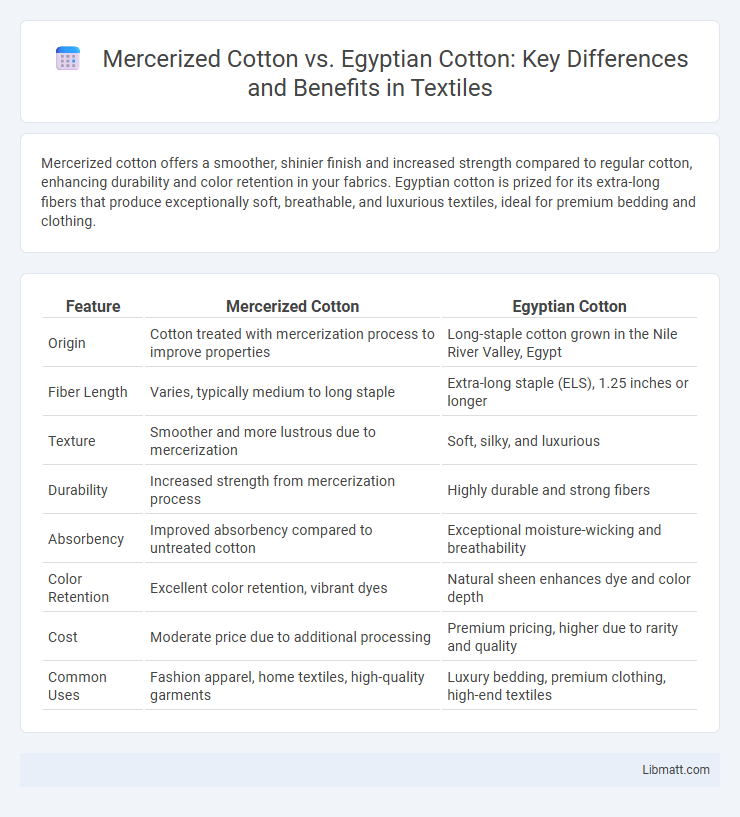Mercerized cotton offers a smoother, shinier finish and increased strength compared to regular cotton, enhancing durability and color retention in your fabrics. Egyptian cotton is prized for its extra-long fibers that produce exceptionally soft, breathable, and luxurious textiles, ideal for premium bedding and clothing.
Table of Comparison
| Feature | Mercerized Cotton | Egyptian Cotton |
|---|---|---|
| Origin | Cotton treated with mercerization process to improve properties | Long-staple cotton grown in the Nile River Valley, Egypt |
| Fiber Length | Varies, typically medium to long staple | Extra-long staple (ELS), 1.25 inches or longer |
| Texture | Smoother and more lustrous due to mercerization | Soft, silky, and luxurious |
| Durability | Increased strength from mercerization process | Highly durable and strong fibers |
| Absorbency | Improved absorbency compared to untreated cotton | Exceptional moisture-wicking and breathability |
| Color Retention | Excellent color retention, vibrant dyes | Natural sheen enhances dye and color depth |
| Cost | Moderate price due to additional processing | Premium pricing, higher due to rarity and quality |
| Common Uses | Fashion apparel, home textiles, high-quality garments | Luxury bedding, premium clothing, high-end textiles |
Introduction to Cotton Types
Mercerized cotton undergoes a chemical treatment that enhances its strength, sheen, and dye absorption, making it ideal for vibrant, durable textiles. Egyptian cotton, known for its extra-long staple fibers, provides superior softness and breathability, often regarded as the premium choice for luxury bedding and clothing. Understanding these distinct cotton types can help you select fabrics that balance durability and comfort based on your specific needs.
What is Mercerized Cotton?
Mercerized cotton is a type of cotton that undergoes a special treatment process involving sodium hydroxide, which enhances its strength, luster, and dye absorption. This mercerization process results in smoother, shinier fibers with increased durability compared to regular cotton. Unlike Egyptian cotton, which is prized for its long staple fibers, mercerized cotton focuses on improving the texture and appearance of the cotton fabric through chemical enhancement.
What is Egyptian Cotton?
Egyptian cotton is a type of premium cotton grown exclusively in the Nile River Valley, renowned for its extra-long staple fibers that produce exceptionally soft, strong, and durable fabric. Its superior fiber length results in higher thread counts and a luxurious finish, making it a favorite for high-quality bedding and clothing. The natural moisture absorbency and breathability of Egyptian cotton enhance comfort, distinguishing it from other cotton varieties like mercerized cotton.
Key Differences Between Mercerized and Egyptian Cotton
Mercerized cotton undergoes a chemical treatment process that enhances its strength, luster, and dye affinity, resulting in a smoother and shinier fabric compared to untreated cotton. Egyptian cotton is prized for its long staple fibers, which produce finer, stronger, and softer yarns, contributing to highly durable and luxurious textiles. Unlike Egyptian cotton's emphasis on fiber length and quality, mercerization focuses on improving the physical properties of the cotton through finishing techniques.
Texture and Feel Comparison
Mercerized cotton boasts a smooth, lustrous finish achieved through a special chemical treatment that enhances fiber strength and sheen, making the fabric softer and more durable. Egyptian cotton features extra-long staple fibers, resulting in an exceptionally soft, breathable texture that feels luxurious against your skin. While Mercerized cotton delivers a polished and silky touch, Egyptian cotton offers a naturally plush and airy feel, ideal for premium bedding and garments.
Durability and Longevity
Mercerized cotton undergoes a chemical treatment that strengthens fibers, enhancing durability and resistance to wear over time, making it ideal for frequently used textiles. Egyptian cotton, known for its extra-long staple fibers, offers exceptional strength and longevity, maintaining softness and integrity through many wash cycles. Choosing between the two depends on your preference for a smooth, lustrous finish with mercerized cotton or the naturally strong, enduring quality of Egyptian cotton.
Breathability and Comfort
Mercerized cotton offers enhanced breathability due to its smooth, polished fibers that allow better air circulation, making it comfortable for warmer climates. Egyptian cotton, known for its extra-long staple fibers, provides superior softness and durability, resulting in a luxurious feel and excellent moisture absorption for all-day comfort. Both cotton types excel in breathability and comfort, but Egyptian cotton is often favored for its premium softness and cooling properties.
Care and Maintenance Requirements
Mercerized cotton requires gentle washing with mild detergents and benefits from air drying to maintain its sheen and strength, while Egyptian cotton, known for its long fibers, demands careful handling with cold water washing and low-heat drying to prevent fiber damage. Both types of cotton should avoid bleach and harsh chemicals to preserve fiber integrity and durability. Proper care extends the lifespan and softness, preserving the luxurious feel characteristic of mercerized and Egyptian cotton textiles.
Cost and Value Analysis
Mercerized cotton typically costs less than Egyptian cotton due to its widespread availability and the mercerization process that enhances luster and strength without significantly increasing price. Egyptian cotton, renowned for its long staple fibers, commands a premium price reflecting superior softness, durability, and luxury. Consumers often find greater long-term value in Egyptian cotton because of its enhanced quality and longevity despite the higher initial investment.
Which Cotton is Right for You?
Mercerized cotton boasts a smooth, shiny finish and enhanced strength due to a special treatment that increases its absorbency and dye affinity, making it ideal for vibrant, durable textiles. Egyptian cotton, renowned for its extra-long fibers, delivers superior softness and breathability, perfect for luxurious, high-quality bedding and clothing. Your choice depends on whether you prioritize the lustrous durability of mercerized cotton or the plush comfort and elegance unique to Egyptian cotton.
Mercerized Cotton vs Egyptian Cotton Infographic

 libmatt.com
libmatt.com